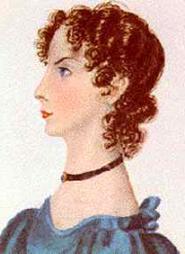I've always felt sort of sorry for Anne Bronte. Despite being the youngest sibling, she never made it to 30, and she seems to have had it pretty rough. She's constantly described as meek, retiring, shy, sweet and the like. Hardly the ideal temperament for a governess. It's also said though that she was unusually resolute, so very much like Agnes.
Plus you kind of get the idea that sister Charlotte wasn't that keen on her. I arrive at this based on a couple of pieces of evidence.
 |
| Yikes |
1) This fairly horrific portrait. I assume it's bad drawing on CB's part, rather than Anne having the misfortune also to have an obscenely long neck.
3) Charlotte would only agree to publish Emily and Anne's poems anonymously as they referred to their made up world that she was not part of, Charlotte being closer to her older brother than her younger sisters. She refused to republish the Tenant of Wildfell Hall After Anne's death, as she didn't think the book very consistent with her idea of her dead sister "'(Wildfell Hall) it hardly appears to me desirable to preserve. The choice of subject in that work is a mistake–it was too little consistent with the character–tastes and ideas of the gentle, retiring inexperienced writer".
Nice.
 Agnes Grey is based partially on Anne's own experiences at home and as a governess. She paints a complex and depressing portrait of 'the governess', a familiar character in 19th Century fiction. Often a fairy Godmother, or a Wicked Stepmother to their pupils, we see life from Agnes' perspective in unfamiliar houses- not a servant as such, but certainly not a relative. Coming from a loving, sheltered, but impoverished background, she is completely at a loss to discover the spoiltness, mean-ness and vindictiveness that exists in the children of the upper middle classes. Expected to mould, influence and improve, but not to scold or to discipline in any way, Agnes struggles to win the goodwill of her employers or the affection of her charges.
Agnes Grey is based partially on Anne's own experiences at home and as a governess. She paints a complex and depressing portrait of 'the governess', a familiar character in 19th Century fiction. Often a fairy Godmother, or a Wicked Stepmother to their pupils, we see life from Agnes' perspective in unfamiliar houses- not a servant as such, but certainly not a relative. Coming from a loving, sheltered, but impoverished background, she is completely at a loss to discover the spoiltness, mean-ness and vindictiveness that exists in the children of the upper middle classes. Expected to mould, influence and improve, but not to scold or to discipline in any way, Agnes struggles to win the goodwill of her employers or the affection of her charges.
 Agnes Grey is based partially on Anne's own experiences at home and as a governess. She paints a complex and depressing portrait of 'the governess', a familiar character in 19th Century fiction. Often a fairy Godmother, or a Wicked Stepmother to their pupils, we see life from Agnes' perspective in unfamiliar houses- not a servant as such, but certainly not a relative. Coming from a loving, sheltered, but impoverished background, she is completely at a loss to discover the spoiltness, mean-ness and vindictiveness that exists in the children of the upper middle classes. Expected to mould, influence and improve, but not to scold or to discipline in any way, Agnes struggles to win the goodwill of her employers or the affection of her charges.
Agnes Grey is based partially on Anne's own experiences at home and as a governess. She paints a complex and depressing portrait of 'the governess', a familiar character in 19th Century fiction. Often a fairy Godmother, or a Wicked Stepmother to their pupils, we see life from Agnes' perspective in unfamiliar houses- not a servant as such, but certainly not a relative. Coming from a loving, sheltered, but impoverished background, she is completely at a loss to discover the spoiltness, mean-ness and vindictiveness that exists in the children of the upper middle classes. Expected to mould, influence and improve, but not to scold or to discipline in any way, Agnes struggles to win the goodwill of her employers or the affection of her charges.
Bronte states at the beginning that she's not aiming to entertain, to enchant or amuse, she just wants to speak to people to whom her writing is relevant- presumably governesses, those aiming to enter the governing profession and those who employ them. Anybody who has ever found themselves out of their depth or doing something difficult out of necessity will be able to relate to Agnes' story. Her feelings of isolation, the impossible expectations placed on her by her unreasonable employers and her absolute inability to please them, no matter how reasonable, enthusiastic and appropriate her behaviour are also pretty relevant to the modern reader.
Agnes Grey isn't an exciting book, it was never intended to be. It's lacks the romance, suspense and adventure of the novels of the other Brontes. It is however well written, quite lyrical and very honest. Short and sweet, if lacking in plot. It is what it says that it is from the beginning, the Diary of a Governess.

No comments:
Post a Comment